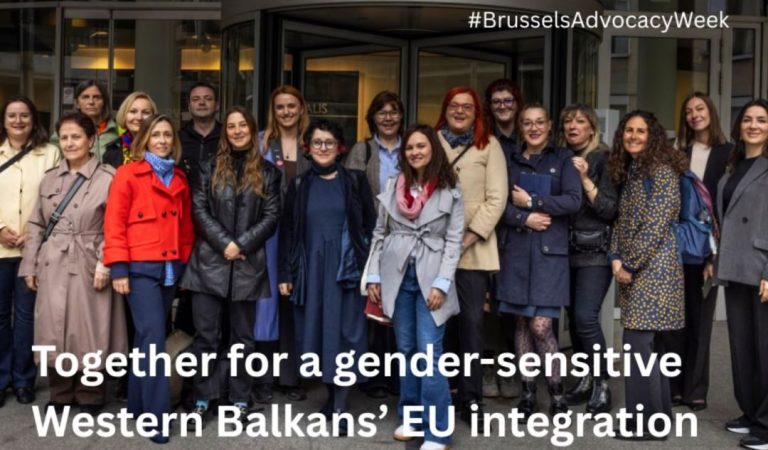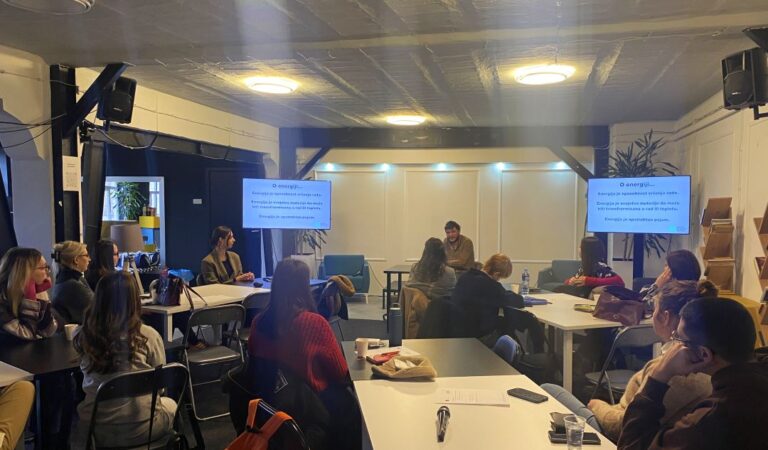At the beginning of the forum, Marko Vasiljević from the A 11 Initiative emphasized the importance of economic and social rights for the improvement of the position of the LGBTI population in Serbia and countries of the region. He pointed out that the main idea of the A 11 Initiative when organizing this forum was to open a space for the discussion and exchange of views between different organizations dealing with the LGBTI population, in order to explore opportunities to strengthen advocacy for better LGBTI status through the use of protection mechanisms and legal frameworks ensuring economic and social rights.
At the beginning of the discussion, Jelena Čolaković from the Juventas organization, Montenegro, stated that in terms of the realization of economic and social rights of LGBTI persons, the reality is entirely different from what is guaranteed by the Constitution and that the Constitution of Montenegro “guarantees all possible and imaginable rights”, but in practice the situation is quite different. The same is indicated by studies carried out on rights of LGBTI people in her country. She shared experiences of this network in dealing with the economic and social position of the LGBTI population in the countries of the region.
Marija Vuletić, a LGBTI activist from Bosnia and Herzegovina, stated that when it comes to the exercising of LGBTI rights, it has become important “who belongs to which group”, and that eighty percent of people do not know what are their economic and social rights. Finally, she stated that trans persons are the most discriminated against in the labor market and usually they can find employment only in the non-governmental sector or in the grey economy, the latter of which provides no guaranteed rights or entitlements to social, health or unemployment insurance. In terms of exercising her right to housing, she also mentioned huge issues outed LGBTI people face when trying to rent an apartment in Bosnia and Hercegovina and discrimination in that respect.
Janset Kalan spoke about her experience in working with the LGBTI community in Turkey and organizations working with trans people.
Dragana Todorović from LGBTI ERA for Western Balkans and Turkey, stressed that the exercising of economic and social rights of LGBTI persons depends, to a large extent, on whether the state administration will act arbitrarily or impartially. In this regard, she pointed specifically to the increasingly visible problem of taking custody away from lesbians. She further emphasized the importance of training of public administration employees, due to the fact that, based on the success or otherwise of these trainings and courses, staff working in public administration will discriminate against LGBTI persons and in some cases deny them the right to exercise their economic and social rights.
Ludo Swinnen from East Meets West briefly presented experiences of this organization in improving the LGBTI position and the focus of this organization on the business sector. Formation of a “chamber of commerce for LGBTI people” was presented which aim to link large companies with young and other LGBTI individuals in need of financial stability and income in order to ensure their self-sufficiency. He also emphasized the importance of education for changing the views of young people on groups that have been historically discriminated against, and also on attitudes toward LGBTI people. At the same time, he pointed out the importance of the economy and business sector for the improvement of the position of LGBTI people.
The forum also highlighted the importance of establishing support systems for outed LGBTI children and young people, as well as for members of their families who often have to deal with social stigma, discrimination and violence against LGBTI people.
Regarding the prevailing trends in terms of LGBTI rights, it has been pointed out that the most at-risk are the rights to work of LGBTI persons, and that it is necessary to pay more attention to children living in same-sex unions, and to discrimination against them.
In addition, the importance of the private sector for the advancement of the economic and social rights of LGBTI persons was discussed, as well as the need to better link organizations dealing with LGBTI rights and/or economic and social rights with communities, or individuals who face problems and discrimination in exercising their rights, aimed at improving the situation in this area.
Several actions were emphasized at the end of the forum aimed at changing the current situation in this respect:
- Improving the reporting of cases of violation of rights of LGBTI people and discrimination against them, in order to hold accountable persons violating these rights in each single case;
- It is necessary to strengthen advocating actions in order to improve the situation in this area. Advocating with provision of best practice could result in positive changes in different areas of importance and to the reduction and elimination of discrimination against LGBTI people;
- Special attention should be given to the fact that LGBTI people exercise their rights usually at the local level, in the local authorities and local communities they live in; therefore it is necessary to strengthen capacities of local authorities, in order for them to be more competent when dealing with cases regarding the exercising of rights of LGBTI people;
- Economic empowerment of LGBTI persons is crucial for the advancement and enjoyment of many other economic and social rights, both in Serbia and in the countries in the region;
- Cooperation with trade unions and other movements on issues of common interest for the realization of economic and social rights could have positive effects on the changing situation in this field;
- In a situation of general deterioration of economic and social rights, it is necessary to consider the building of alliances that will be more efficient in bringing changes in the area of economic and social rights of LGBTI persons, as well as to other citizens.



